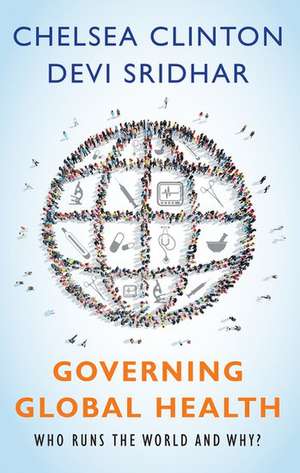Governing Global Health: Who Runs the World and Why?
Autor Chelsea Clinton, Devi Sridharen Limba Engleză Paperback – 14 mar 2019
organizations may be national, regional, international, or even non-state organizations-like Medicins Sans Frontieres. One of the more important recent trends in global health governance, though, has been the rise of public-private partnerships (PPPs) where private non-governmental organizations,
for-profit enterprises, and various other social entrepreneurs work hand-in-hand with governments to combat specific maladies. A primary driver for this development is the widespread belief that by joining together, PPPs will attack health problems and fund shared efforts more effectively than other
systems. As Chelsea Clinton and Devi Sridhar show in Governing Global Health, these partnerships are not only important for combating infectious diseases; they also provide models for developing solutions to a host of other serious global health challenges and questions beyond health. But what do we actually
know about the accountability and effectiveness of PPPs in relation to the traditional multilaterals? According to Clinton and Sridhar, we have known very little because scholars have not accumulated enough data or developed effective ways to assess them-until now. In their analysis, they uncovered
both strength and weaknesses of the model. Using principal-agent theory in which governments are the principals directing international agents of various type, they take a closer look at two major PPPs-the Global Fund to Fight HIV/AIDS, TB and Malaria and the GAVI Alliance-and two major more
traditional international organizations-the World Health Organization and the World Bank. An even-handed and thorough empirical analysis of one of the most pressing topics in world affairs, Governing Global Health will reshape our understanding of how organizations can more effectively prevent the spread of communicable diseases like AIDS and reduce pervasive chronic health problems like
malnutrition.
| Toate formatele și edițiile | Preț | Express |
|---|---|---|
| Paperback (1) | 97.76 lei 10-16 zile | +34.19 lei 4-10 zile |
| Oxford University Press – 14 mar 2019 | 97.76 lei 10-16 zile | +34.19 lei 4-10 zile |
| Hardback (1) | 140.43 lei 31-37 zile | |
| Oxford University Press – 30 mar 2017 | 140.43 lei 31-37 zile |
Preț: 97.76 lei
Preț vechi: 117.01 lei
-16% Nou
18.71€ • 20.33$ • 15.73£
Carte disponibilă
Livrare economică 20-26 martie
Livrare express 14-20 martie pentru 44.18 lei
Specificații
ISBN-10: 0190865989
Pagini: 304
Ilustrații: 33 black and white line drawings; 2 color inserts
Dimensiuni: 145 x 226 x 20 mm
Greutate: 0.36 kg
Editura: Oxford University Press
Colecția OUP USA
Locul publicării:New York, United States
Descriere
The past few decades have seen a massive increase in the number of international organizations focusing on global health. Campaigns to eradicate or stem the spread of AIDS, SARS, malaria, and Ebola attest to the increasing importance of globally-oriented health organizations. These
organizations may be national, regional, international, or even non-state organizations-like Medicins Sans Frontieres. One of the more important recent trends in global health governance, though, has been the rise of public-private partnerships (PPPs) where private non-governmental organizations,
for-profit enterprises, and various other social entrepreneurs work hand-in-hand with governments to combat specific maladies. A primary driver for this development is the widespread belief that by joining together, PPPs will attack health problems and fund shared efforts more effectively than other
systems.
As Chelsea Clinton and Devi Sridhar show in Governing Global Health, these partnerships are not only important for combating infectious diseases; they also provide models for developing solutions to a host of other serious global health challenges and questions beyond health. But what do we actually
know about the accountability and effectiveness of PPPs in relation to the traditional multilaterals? According to Clinton and Sridhar, we have known very little because scholars have not accumulated enough data or developed effective ways to assess them-until now. In their analysis, they uncovered
both strength and weaknesses of the model. Using principal-agent theory in which governments are the principals directing international agents of various type, they take a closer look at two major PPPs-the Global Fund to Fight HIV/AIDS, TB and Malaria and the GAVI Alliance-and two major more
traditional international organizations-the World Health Organization and the World Bank.
An even-handed and thorough empirical analysis of one of the most pressing topics in world affairs, Governing Global Health will reshape our understanding of how organizations can more effectively prevent the spread of communicable diseases like AIDS and reduce pervasive chronic health problems like
malnutrition.
Recenzii
Who runs the world and why? Chelsea Clinton and Devi Sridhar ask this audacious question in this powerful and uncompromising book. They unmask the big four global health institutions of our era for the first time. Governing Global Health is a monumental achievement. Anyone seriously interested in the health of the world simply has to read it." - Lawrence O. Gostin, University Professor and Founding O'Neill Chair in Global Health Law, Georgetown Law School
The landscape of 'global health' is so fragmented, with so many agencies and private players in the picture, that it can be impossible to figure out who is in charge of everything from outbreaks to battling the tobacco industry. The adage, 'follow the money' too often leads to dead ends and bewildering arrays of public health players. Clinton and Sridhar have done a wonderful job of pulling the elusive pieces into focus, creating a must-read guide for students and practitioners of global health." - Laurie Garrett, Senior Fellow for Global Health, Council on Foreign Relations, and author of The Coming Plague
Clinton and Sridhar provide a unique insight in global health governance in a very rigorous and well documented analysis. A must for anybody working in global health, global governance and international affairs." - Peter Piot, Director & Handa Professor of Global Health, London School of Hygiene & Tropical Medicine














